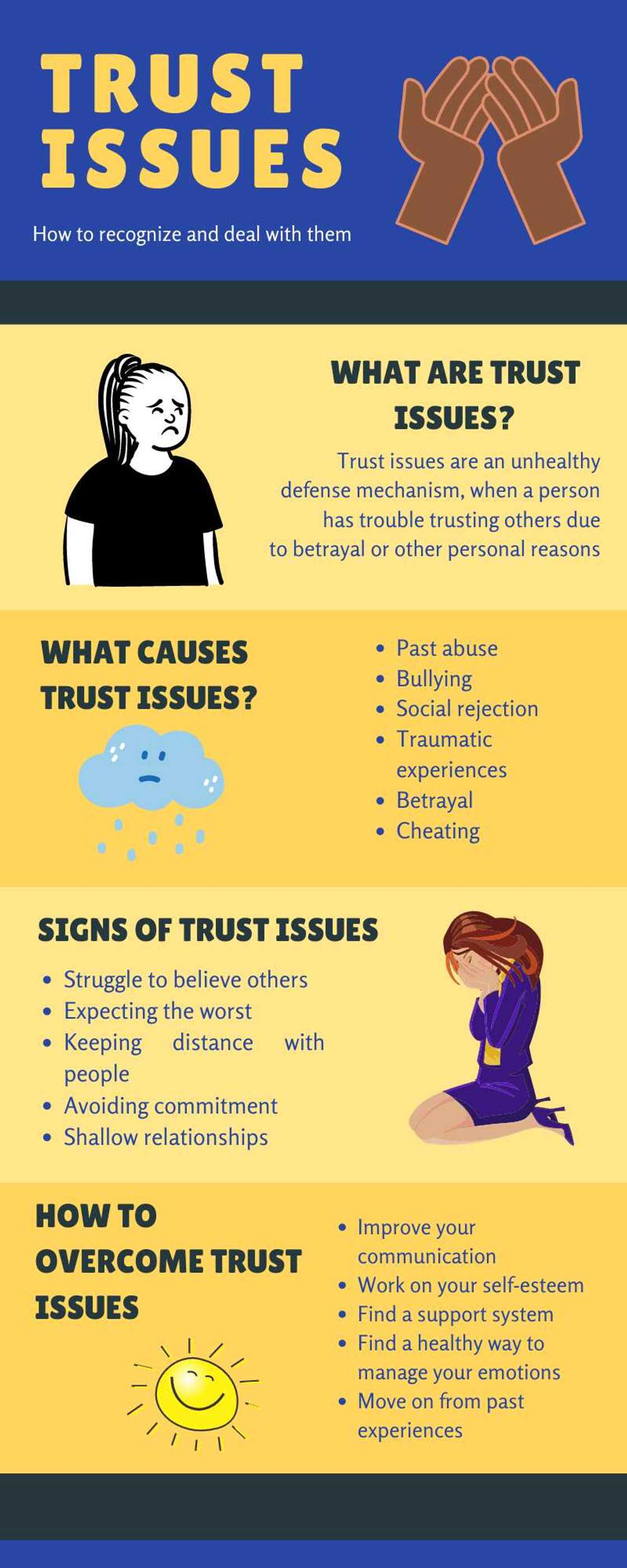What are trust issues: How to recognise and deal with them
Some people struggle with trust issues, which severely damages their quality of life. This problem is not an easy one to deal with and can stem from plenty of experiences. Still, it is possible to put up a fight against this mentality and learn how to trust again.

Source: UGC
Do you ever feel like you can't trust anyone? Is this affecting the quality of your relationships?
If you are one of these people who has "I don't trust anyone" as their life motto, then recognizing the problem and working on it should be your priority.
Mistrustful people who are constantly suspicious of everyone around them should deal with this mentality by building their self-esteem and letting go of their negative past experiences.
Here is a guide on how to trust others.
What are trust issues?
This term indicates a special kind of defense mechanism that can be unhealthy and lead to relationship issues.
People dealing with trust issues are excessively suspicious and mistrustful. They expect the worst, such as being hurt or betrayed, from every relationship, and have trouble opening up.
Where do trust issues come from?
So, what causes trust issues? Usually, they come from early life experiences, the memories of which tend to stay with us for our whole life.
People who have been abused or mistreated in their childhood are more likely to struggle with trusting people. The same goes for those who used to be social outcasts and dealt with bullying.
Additionally, these problems could develop due to experiencing any traumatic event, ranging from accidents and losses to your partner cheating on you.
What are the signs of trust issues?

Source: Getty Images
First of all, you need to check out these signs and determine whether this problem deeply affects your relationships. If it does, it is important to work on overcoming the issue.
1. You do not believe what other people say
If someone has lied to you in the past, it may be easy to project this experience onto every new relationship.
Therefore, in your new union, you may constantly doubt and question what your partner has said, and wonder whether there is an underlying lie in their words.
2. You always expect the worst
People who have been hurt in the past usually struggle to let their guard down and stop anticipating the worst.
Due to the lack of trust, you may feel like your partner can betray you any second or take advantage of you, even if they have no such intentions.
3. You keep your distance with people
There is a battle inside you - on one hand, you long for meaningful relationships and mutual understanding. On the other hand, however, letting anyone too close to you is a big "no", since you are scared that they will hurt you.
Because of this, reaching emotional and physical intimacy is hard for you, and others may consider you a loner.
4. You avoid commitment
Trust issues and fear of commitment usually go side by side.
Even if you start caring about someone, you are just not ready to let them into your life permanently.
Usually, it happens due to the fear of becoming too intimate with this person and then getting hurt at your most vulnerable moments.
5. You have shallow relationships
Even though you and your partner may not be shallow people, in your relationship you only talk about "safe" topics.
This means that you are scared of opening up too much to them, and are protecting your true self.
There are more signs, but these ones are the most obvious that signify that you have a problem with trusting others.
Learning to trust again: How to overcome trust issues
Many people would like to know how to deal with trust issues and learn to open up to people they are close with.

Source: Getty Images
Though it may take a lot of work and self-awareness, it is possible to make things better for yourself.
1. Improve your communication
Stop monitoring your partner's activities and give them some space.
Try to give them trust before getting suspicious, and you will see how different this feels.
2. Avoid blaming your partner
Blaming someone always makes things worse than they were before. Change your approach and find out more details before resorting to accusations.
3. Go to therapy
If this issue is starting to severely affect your relationships, perhaps you should see a professional to help you overcome the issue.
Alternatively, you and your partner could see a couples' counselor.
4. Work on building your self-esteem
Insecurities can make you feel unworthy of your partner, which leads to the fear of them leaving you.
Raising your self-esteem and training yourself to think positively is a large step forward.
5. Find support among people who love you
If you have any family members or friends who are supportive, you can try talking to them about your problem.
Gaining some perspective from them, or just having them listen to you, will possibly be therapeutic.
6. Find a healthy way to manage your emotions

Source: Getty Images
Learn to cope with your anxiety and negative emotions before you end up lashing out at your partner.
Some ways to process them in a non-destructive way include listening to music, going for a walk, or journaling your feelings.
7. Move on from past experiences
A huge step on your way to recovery would be moving on from past hurt.
For instance, your previous partner may have cheated on you, damaging your trust, and now you are extra careful in relationships.
Still, your current partner is not your ex, and your past experiences should not linger over what you have right now.
8. Trust yourself
Self-trust is just as important if you want to recover from any pain caused by your past.
You may have made mistakes in the past, which led to you being hurt, but these experiences do not define you.
In fact, they are a stepping stone towards you becoming a better person and learning more about yourself.
Trust issues are a serious problem, but it is possible to recover from it. We wish you strength on your way towards healing.
READ ALSO: How to catch a cheater in the act and confront them about it
When someone you love seems to be cheating on you, it is one of the most painful feelings in the world.
Legit.ng has advice on exposing a cheater and confronting them about their infidelity. Check out these tips on how to do it effectively.
Source: Legit.ng








